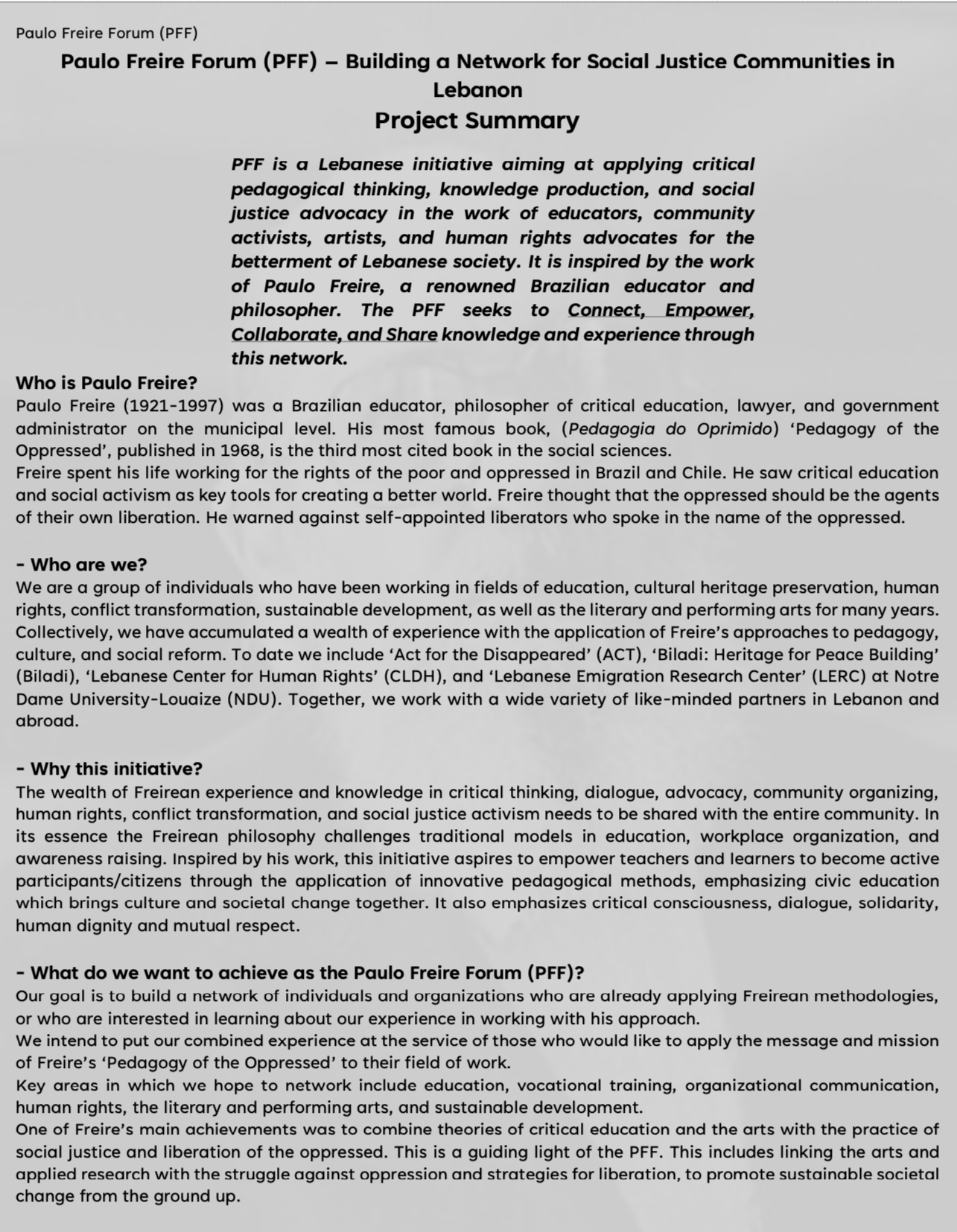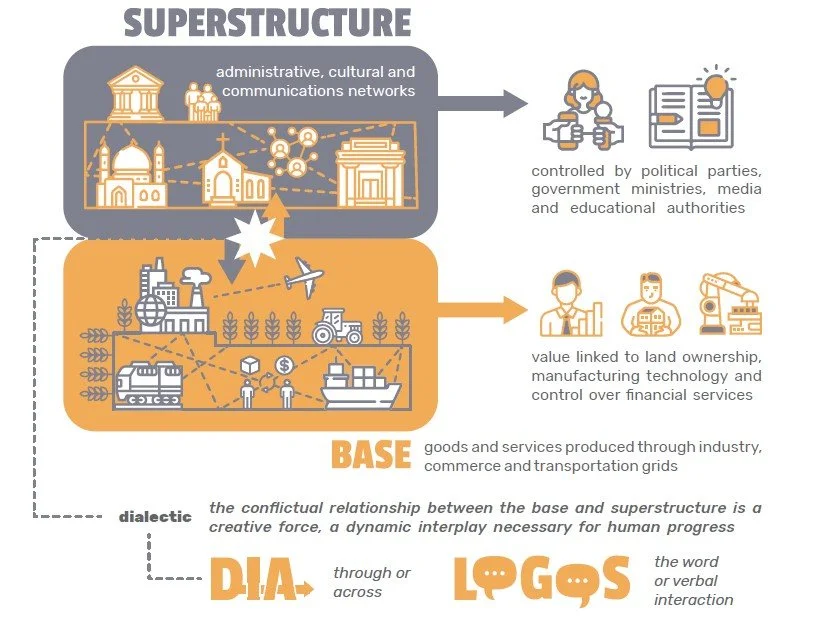Democratic Renewal
Human Rights of Human Resources (HRofHR): Workforce Interventions Toward Democratic Renewal in Lebanon
Project Team: Rouba El-Helou & Eugene Sensenig
Geography: Southwest Asia and North Africa
Summary: With many impasses for democratic renewal within formal governmental structures in the WANA region, the workplace provides an environment where cultural and political changes can be seeded. Based in Lebanon, the project team will develop workplace trainings linking together human resources development (HRD) and diversity, equity and inclusion (DEI), with a particular focus on cross-cultural coexistence and gender. Through their organizational partners, they will review, test, and introduce the trainings to multiple organizations across industries and sectors in Lebanon.
Experimental Questions
How can we promote new norms for coexistence along the lines of diverse religious communities, ethnic groups, social classes, gender, sexual orientation, and diversely-abled populations?
How might we introduce new strategies for gender equality?
What are well-received language framing and training approaches for various workplaces?
How might the pedagogy of Legislative Theatre improve the learning process and outcomes?
Methods & Themes
The HRofHR experiment for change is founded on four themes, delivered in a blended module approach. Participating organizations build on their experience with corporate social responsibility (CSR), sustainability, and DEI in order to make the workplace an arena for promoting human rights collaboratively, thus serving the bottom line together.
-
HRD has witnessed a sustainable evolution in recent decades, shifting from initial attempts focused on organizational change and team management to a prioritization of efficiency and profitability models through the ‘team concept’, ‘Kaizen’, the ‘Ulrich Model’ and ‘lean workplace’, among many others. While these models have successfully contributed to organizational transformation, they have often seen the workplace as a set of systems; progress was made without the comprehensive collaboration and engagement of all stakeholders.
A paradigm shift towards placing the human being at the center of organizational life has since emerged. This transformation has embraced an intersectional lens, encompassing all stakeholders in technological and organizational change. CSR programs involving HRD from the outset have proven that inclusive participation at all organizational levels (management, and all staff members) enhances holistic management and drives bottom line results.
The HRofHR experiment for change builds on the advances made in Lebanon to introduce human rights as a strategic asset for both management and staff. This initiative aligns already existing good practice within organizations with the UN Global Compact, Caux Round Table Principles, ISO 26000, and CSR coalition standards.
-
Around the globe, changes in technology and work organization have been an arena to promote positive social change. Traditionally, both businesses and the labor movement have recognized the workplace as a platform for achieving tangible improvements of mutual benefit. Historically, emphasis was placed on addressing racial, religious-sectarian, and gender-based discrimination. Today the scope of DEI has significantly expanded.
-
For us, coalition-building is a strategic approach to advancing work on social justice, belonging, and DEI. We unite diverse stakeholders from education, culture, conflict resolution/transformation, sustainable development as well as relying on the literary and performing arts. This allows us to create a powerful force advocating for social justice. We emphasize the collective strength which each member brings, we also foster a sense of belonging through an inclusive process, providing a pool of resources, expertise to drive policy changes and foster inclusive and equitable workplaces.
-
We are inspired by the work of Paulo Freire and Augusto Boal.
“Legislative Theater” is a participatory process in which stakeholders work together to identify and address challenges and mutually design tangible, hands-on solutions. Participants identify, build, develop and advocate for concrete steps towards policy change. Since the 1990s, this approach has been successfully implemented worldwide.
Legislative Theater aims to allow participants to turn their workplace diversity into a source of strength.
Pathway to Transform International Governance
The HRofHR experiment for change in Lebanon is grounded in a comprehensive framework which incorporates globally recognized standards such as CSR coalitions, sustainability mechanisms, DEI, ILO norms, ISO 26000, and other recognized traditions on the global market. The project team actively collaborates with regional and international groups including the UN Global Compact and the Caux Round Table, and the UN Office of the High Commissioner for Human Rights (OHCHR) in Beirut in an effort to encourage the adoption of these just governance principles among private entities, academic institutions, and civil society groups. Our approach is informed by the work of Paulo Freire, Augusto Boal, and the ‘Political Economy of Sectarianism and Coexistence’ framework. Therefore, by integrating Freirean methodologies and the Legislative Theater approach, the project aims to contextualize transformative change within local cultures and apply them in other sectors and regions.
This experiment also incorporates lessons learned from social clauses, gender auditing, and diversity management initiatives. By relying on recent applied research and field studies carried out in Lebanon, we have laid the foundation for further developing and upscaling our framework. In particular, the "Gender Mainstreaming Oil and Natural Gas in Lebanon" study, by exploring gender, youth, inclusion, and governance in the extractive industries, has established a solid benchmark of good practice facilitating the rethinking of workplace diversity management and human rights in Lebanon and in the WANA region.
Resources & Updates
Paolo Freire Forum (PFF)
Paulo Freire Forum (PFF) – Building a Network for Social Justice Communities in Lebanon
PFF is a Lebanese initiative aiming at applying critical pedagogical thinking, knowledge production, and social justice advocacy in the work of educators, community activists, artists, and human rights advocates for the betterment of Lebanese society. It is inspired by the work of Paulo Freire, a renowned Brazilian educator and philosopher. The PFF seeks to Connect, Empower, Collaborate, and Share knowledge and experience through this network.
Open Pedagogy and Paulo Freire
A presentation by Dr. Eugene Sensenig about "Open Pedagogy of the Oppressed" and "Open Legislative Theatre," building on the work and ideas of Paulo Freire and Augusto Boal. This presentation was given on March 7 2024 to Open Education Week (OEW) at Notre Dame University-Louaize (NDU): A Journey into Open Education.
The Political Economy of Coexistence allows analysts and activists alike to go beyond mere declarations of intent; to deal with the material foundations of sectarianism and lay the groundwork for intersectional cooperation.
To go beyond awareness-raising and coalition building to actually change the physical environments in which we work, build our communities, and invest in rebuilding the country, this is what is meant by ‘PE of Coexistence.’ It transcends the study of toxic sectarianism and searches for ways in which tangible foundations for coexistence are being created in industry, agriculture, technology, and commerce today. It took its start with the “Dealing with the past: Memory for the future” project, which began in spring 2021 through a collaboration with the UN Office of the High Commissioner for Human Rights (OHCHR) in Beirut. Find reference to preliminary work on the Political Economy of Sectarianism in video as of minute 7:01. See video here.
Download the full PDF by clicking here.
What is the Political Economy of Coexistence?
The Introduction - Political Economy of Sectarianism & Coexistence in Lebanon
What is the Base-Superstructure Dialectic? This video explains The ‘Political Economy (PE) of Coexistence’ as a new concept for the West Asia and North Africa (WANA) region.
The HRofHR project uses a bottom-up and top-down approach. It is influenced by the Scholarship of Teaching and Learning (SoTL) framework, focusing on both industry, technology, and commerce, as well as education, media, and religious diversity - or the so-called “Base-Superstructure Dialectic”.
-
This ‘experiment for change’ offers enterprises – both employers and staff – a unique opportunity to transform ‘toxic sectarianism’ into confessional collaboration and coexistence from the bottom up.
Human rights are the cornerstone of workforce development and key to improving the bottom line. Our focus on democratic interaction fosters open communication on the base, thus valuing all voices within an organization. We go beyond the intersectional checklist often used when applying a human rights approach. Diversity, Equity and Inclusion (DEI) allow change to be comprehensive, sustainable, and profitable. We partner with employers and employees to develop actionable strategies in targeted areas related to human rights; in which progress can be made quickly and efficiently and productivity thereby enhanced. Our aim is to build a more equitable workplace as a foundation for sustainability and profitability to the benefit of all.
Press Release: FLPS Research Team Awarded Prestigious NYU Law Fellowship
The Center for Human Rights and Global Justice at New York University School of Law awarded a team of researchers at the Faculty of Law and Political Science (FLPS) at Notre Dame University-Louaize (NDU) the Future of Human Rights Governance (FORGE) Experiments for Change fellowship.
-
FORGE kicked off in November 2023 with a major conference in New York City, titled “Reimagining the Future of Rights and Governance”. It gathered like-minded practitioners and academics from around the world. “Against the despair of critics who announce that current challenges spell the ‘end times’ of human rights, the Future of Rights and Governance (FORGE) program at NYU Law is committed to proposing new ideas and strategies for the next generation of global rights and justice thinkers and doers,” says program founder César Rodríguez-Garavito, Professor of Clinical Law and Chair of the Center for Human Rights and Global Justice at NYU School of Law.
At the conference, the FLPS team composed of Rouba El Helou, Lecturer at the FLPS, and Dr. Eugene Sensenig, Professor at the FLPS and Director of the Lebanese Research Center for Migration and Diaspora Studies, presented their Experiment for Change draft project, titled “The Political Economy of Sectarianism and Coexistence – Human Rights of Human Resources” (HRofHR), under the theme of Democratic Renewal.
Meet the Team
-

Eugene Sensenig
CO-LEAD
Professor Eugene Richard Sensenig is a researcher and human rights activist with a global focus. From the study of migrants’ rights in the Alps, championing DEI in the workplace, mainstreaming abilities and disabilities, to combating gender discrimination and economic violence in the extractive industries in the WANA region, he has continuously followed a rights-based approach. Sensenig is the director of the Lebanese Emigration Research Center at Notre Dame University (NDU) – Louaize and works in Europe and the WANA with universities, non-governmental organizations and government players to advance critical pedagogy, just governance and rule-of-law. His publication focuses on global mobility, conflict transformation and intersectionality.
-

Rouba El-Helou
CO-LEAD
Rouba El Helou is an activist-scholar and educator whose work creates a synergetic nexus between human rights research and activism in Lebanon and the WANA region. She is the secretary general of the Lebanese Center for Human Rights. As a Forge Fellow at NYU Law, she is exploring how the Human Rights of Human Resources (HRofHR) experiment can bring change to the workplace as a public space. She is a gender expert, a communication consultant and digital rights activist. She conveys her knowledge through applied social science research in education, social development and publications related to refugee studies, post-colonial theory, rule of law, DEI and human rights.



